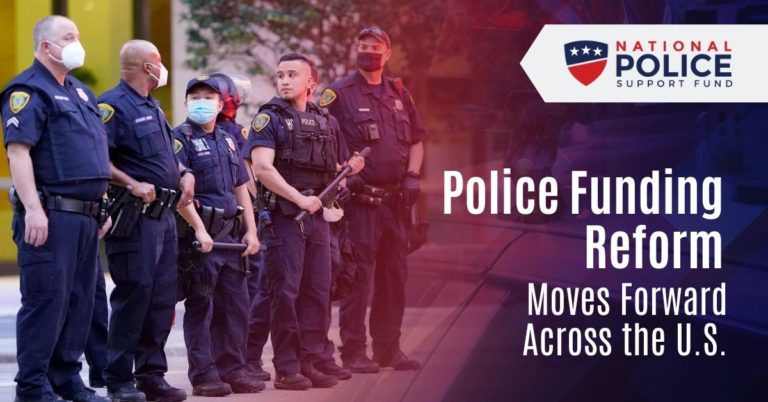In the months following George Floyd’s death, cities and towns across the U.S. are examining how police are funded and whether those funds are allocated in the best way for their communities. The call to defund the police is one of the greatest issues facing law enforcement at this moment.
Although police budgets and operations are controlled at the local level, Democratic presidential candidate Joe Biden has pledged that, if he’s elected, he will do what he can federally to enact reforms during his first 100 days in office.
“Reform means, at least the beginning, banning chokeholds, stopping transferring military weapons of war to the police departments, creating a model use of force standard and holding all police to the high standard,” Biden said at a campaign event with Atlanta Mayor Keisha Lance Bottoms.
The changes, if any, will look different in every community. Here’s a look at some of the big trends and ideas that are being discussed throughout the country.
New York
On June 5, New York Governor Andrew Cuomo released his “Say Their Name” police reform agenda, which would ban chokeholds, allow for transparency in disciplinary records of law enforcement officers, and give more power to the state’s Attorney General to investigate police-involved deaths.
In announcing the plan, Cuomo said he has the best interests of the state’s police officers in mind, and he hopes it will help find and discipline problematic officers who tarnish the reputations of otherwise upstanding organizations.
“Stopping police abuse vindicates the overwhelming majority – 99.9 percent – of police who are there to do the right thing,” It restores the confidence, the respect, and the trust that you need to make this relationship work,” Cuomo said in a statement. “You have to heal the police-community relationship for the sake of the police and for the sake of the community.”
New York City Mayor Bill de Blasio is also considering reforms specific to the NYPD. He plans to redirect at least some portion of the department’s funding to youth initiatives and social services.
“The details will be worked out in the budget process in the weeks ahead, but I want people to understand that we are committed to shifting resources to ensure that the focus is on our young people,” de Blasio told The Guardian.
Minneapolis

Calls for police reform in Minneapolis, the site of Floyd’s death, were quick and severe. While the City Council declared in early June that it would “dismantle and abolish” the police department, the path to doing so has proven to be much more complicated.
Making such a drastic change would require updating the city’s charter, which can only happen through a referendum. The effort to put police reform on the ballot was blocked 10-5 by the Minneapolis Charter Commission.
“We have an obligation to make sure that what is going on the ballot gives the voters an informed choice, that they can make a decision in a thoughtful way,” Charter Commissioner Andrew Kozak told the Minneapolis Star-Tribune, adding that he didn’t think the proposal accomplished that.
It’s unclear where Minneapolis police reform will go next. City Council could vote to create a new public safety department independent of the police, or the proposal to amend the city charter could be put to a public vote sometime next year.
Seattle
Seattle, another hotbed of protests following Floyd’s death, recently voted to uphold police funding. However, the city will move forward with other measures, including removing more than 100 police officers by the end of the year.
The plan that was voted down would have cut Seattle’s police budget by $54 million and re-allocated those funds to other programs, including $34 million to build affordable housing. Councilmember Kshama Sawant introduced the proposal and was the only member to vote in favor of it; seven council members voted against it and one abstained, according to The Daily Beast
“I’m not surprised,” Sawant told KOMO News after the city council’s decision. “But it’s quite interesting to see how council members are now displaying how they actually stand and I hope members of the public are watching.”
While the large-scale budget overhaul did not pass, the council did vote to cut $886,000 from the Seattle Police Department’s budget and add it to $10 million that will be given to community organizations.
Washington, D.C.
Efforts to cut police funding have been more successful in Washington, D.C., where the district’s council voted to cut $15 million from the Metropolitan Police Department’s budget.
Council also passed an amendment that limits the police chief to a four-year term in an effort to curb the power that comes from that position.
“The council, like all Americans, is grappling with undoing centuries of layered systemic racism and its permutations throughout our society,” D.C. Councilmember Charles Allen told WUSA9 News. “There will be no single law or single budget that could possibly provide a single remedy. This is an iterative process just like the way it is to get to where we are today.”
The $15 million removed from the Metropolitan Police Department’s budget will be used to fund the Office of Neighborhood Safety and Engagement and create a Gun Violence Director for the district.
While calls to “defund the police” are easy to share on social media and yell in the street, actually implementing them is much more difficult — and dangerous — for our communities. That is why National Police Support Fund launched an awareness campaign highlighting the facts about defunding police. Learn the Facts About Defunding Police here.









